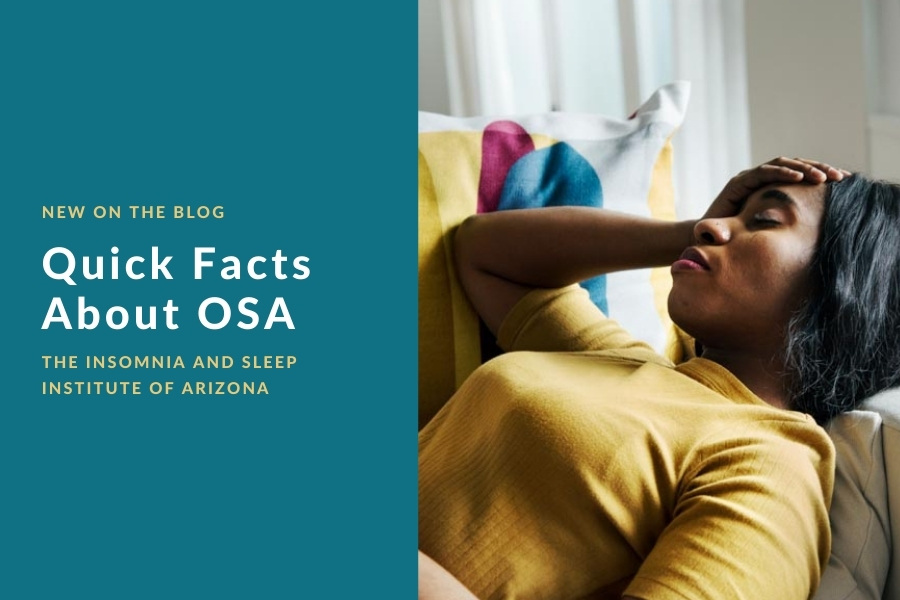There are different types of sleep apnea, but obstructive sleep apnea (OSA) is the most common. The Insomnia and Sleep Institute of Arizona features unprecedented staffing levels where patients have access to multiple sleep specialists as well as a psychologist who focuses on cognitive behavioral therapy, a physician assistant with a Masters in Sleep Medicine, and teams of respiratory therapists. A nurse practitioner trained in sleep medicine and several medical assistants make up the Face of Sleep Medicine in the Phoenix area, and we are all ready to help you improve your nightly sleep.
Obstructive sleep apnea happens when the upper airway gets blocked when asleep. However, central sleep apnea is a little different and it happens when the brain is not signaling the muscles to breathe. OSA can include hundreds of “events” per night, each event consisting of the body not breathing temporarily. This is the apnea part of the condition, and blood oxygen levels quickly drop when after these events take place. Your brain reacts to that drop by waking you to some degree. Many patients do not remember this rousing, but it does encourage the body to start breathing again. However, such disruptions can cause a multitude of issues, such as feeling exhausted the next day even when you think you got enough sleep.
The Dangers of Obstructive Sleep Apnea
Some people think sleep apnea happens just to men (and particularly older men). Although men who are middle-aged and older, as well as overweight, tend to be diagnosed with sleep apnea the most, anyone can have sleep apnea. Both children and women can have sleep apnea, and it is estimated that this disorder affects 9 percent of women and 2 percent of children (compared to 24 percent of men).
There are factors that can trigger or worsen sleep apnea—some are within your control and some largely are not. Obesity is a primary risk factor for OSA. Those with a BMI over 25 are more likely to develop obstructive sleep apnea since fat deposits in the neck/throat can obstruct the airway while you are sleeping. The size of your neck plays a role in OSA, with bigger necks being more prone to sleep apnea. If you struggle to find shirts that are comfortable around the neck, you might be at an increased risk of sleep apnea. This often means a neck larger than 17 inches for men and 16 inches for women.
OSA Matters
In some cases, tonsils can play a role in sleep apnea. Those with large tonsils might find that they get in the way while you’re asleep, leading to sleep apnea. Endocrine disorders are another possible culprit. If you have an endocrine disorder like polycystic ovary syndrome (PCOS), you also have a higher chance of developing sleep apnea. Endocrine problems can cause your body to synthesize an abundance of growth hormones, leading to a larger throat and tongue—which, in turn, can block your airway. Some conditions, such as hypothyroidism, are connected to central sleep apnea since low hormones levels can interfere with how the brain controls breathing.
Treatment for OSA is Available
Treatment for any type of sleep apnea requires a correct diagnosis first. The first line of treatment is using a continuous positive airway pressure (CPAP) device. This positive airway pressure technology uses a small machine, tubing, and a mask that might fit over just your nose or your nose and mouth. There are a number of different types of CPAP accessories, and working with a sleep specialist to determine the best one for you is critical for treatment. A CPAP machine pumps air into the mask with the ideal amount of pressure to keep your airway patent while you sleep.
CPAP machines work great for the vast majority of OSA sufferers. In some cases, though, CPAP machines are not the right fit. Once a patient has tried CPAP therapy and it is determined it is not the right treatment, patients may be recommended to have an implant such as Inspire placed. Implants are internal devices that can force airway muscles to relax in order to achieve an open airway. However, patients are required to give CPAP therapy a try before an implant is considered.
If you have OSA or think you might, connect with The Insomnia and Sleep Institute today. Consultations are always with sleep medicine specialists so you can get on the fast track to diagnosis and treatment. Call (480) 745-3547 or complete the online form today.





